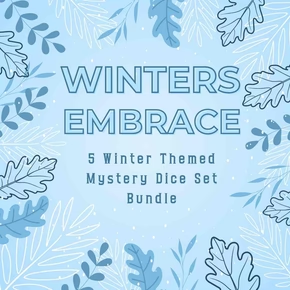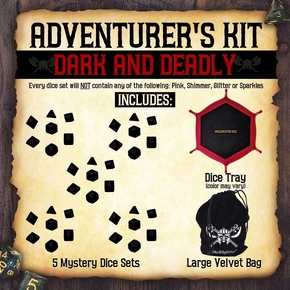Counterspell 5e
I Said NO!
Counterspell is the classic Dungeons & Dragons equivalent of waggling your finger at a lesser spellcaster like a disappointed parent. You shut down another spell as it’s being cast, and their spell simply fizzles out into nothing. If you’re interested in doing your best blue MTG player impression in 5th edition dungeons and dragons, then read on as we go through everything you need to know.
Table of Contents:
Want Endless Dice? Check out our Dice Subscription!
The Spell Itself
Before we dig into the specifics of this particular 5e spell, let’s take a look at the raw spell itself:
Counterspell
3rd-level abjuration
Casting Time: 1 reaction (which you take when you see a creature within 60 feet of you casting a spell)
Range: 60 feet
Components: S
Duration: Instantaneous
You attempt to interrupt a creature in the process of casting a spell. If the creature is casting a spell of 3rd level or lower, its spell fails and has no effect. If it is casting a spell of 4th level or higher, make an ability check using your spellcasting ability. The DC equals 10 + the spell's level. On a success, the creature's spell fails and has no effect.
At Higher Levels. When you cast this spell using a spell slot of 4th level or higher, the interrupted spell has no effect if its level is less than or equal to the level of the spell slot you used.
Who Can Cast Counterspell?
In dnd 5e Counterspell is mostly locked into the arcane casters and can be found on the Sorcerer, Warlock, and Wizard spell list. It’s a 3rd level spell, which means a sorcerer, warlock, or Wizard of 5th level can cast it if they choose to learn it or put it in their spellbook. A few paladin archetypes can also cast it, specifically Oath of Redemption Paladins and Oath of the Watchers paladins. It’s a 3rd level spell though and since paladins are half level spellcasters with slower spell progression, paladins can’t cast it until they reach 9th level.
How Does Counterspell Work?
Counterspell at its most basic function just cancels out somebody else’s spell. You spot an enemy mage about to blast you with a fireball and you just snap your fingers and say “nah” so long as you can see the enemy caster and are within 60 feet of them. It’s a reaction, so you’re casting it on their turn (in most cases), and you’re basically trading out your spell slot to cancel out theirs. However, you're winning out on the action economy since they used their whole turn (ok maybe just an action or bonus action) while you only used a reaction.
That’s how it works so long as you’re countering a spell of 3rd level or lower, or if you cast counterspell at a level equal or higher than the spell you’re countering. This means that if you see the big baddie about to launch some massive spell of death, you’re going to have to match the spell level used, or you have to take a chance on it using a lower-level spell slot.
If you cast counterspell with a lower level spell slot than the spell you’re trying to counter, it’s no longer a sure thing and you instead only have a chance of success by making a check against it rather than making automatic counterspells. The check uses your spellcasting ability (Charisma for Sorcerers, Warlocks, and Paladins, Intelligence for Wizards) but that’s it. It’s not a skill you can add your proficiency, or a saving throw, it’s just your spellcasting ability score bonus + a d20 roll.
Since the DC is equal to 10 + the spell’s level (so presumably at least 4), you’ll on average have a worse than 50-50 chance at ever countering a spell of a higher level, and potentially quite worse odds for really high-level stuff.
Counterspell Vs Dispel Magic
Players commonly mix up counterspell and dispel magic, which is understandable since they do rather similar things. But just for clarification:
- Counterspell is for stopping spells as they’re cast.
- Dispel Magic is for ending spells after they’re already cast (also ongoing magic effects).
A caster looking to shut down enemy magic should probably have both in their arsenal but counterspell specifically is for stopping magic just as it’s happening, Vs stopping magic that has already gone into effect.
What Do I Know About the Spell I Counter?
Say the enemy caster readies up a 4th-level fireball at the party and you move to counterspell it. But wait, do you actually know the spell’s level? Or what spell they’re casting for that matter? It’s not like they’re announcing their spells beforehand, or are they?
These are the questions most likely to cause arguments surrounding counterspell and sadly there aren’t many clean answers and it’s largely left up to DM discretion. Your DM may decide to loudly announce that the enemy is casting a fireball, or they may simply tell the players to roll a Dexterity save against it. Exactly how much information you have before you choose to cast a counterspell or not is entirely up to your DM. We did get some rulings in Tasha’s saying that a player can use their reaction to make an Arcana check to determine the nature of a spell as it’s being cast, but that hardly helps us here since we need that reaction to cast the counterspell itself.
There are some arguments that can be made about the verbal and somatic components or thematic “how big does the spell look” type considerations, but in the end it’s all up to the DM without a proper official ruling.
A decent middle ground that I’ve seen several DM’s use is to say that if you know the spell being cast (as in the spell is one you can cast) then you recognize it when it’s cast by another spellcaster.
Counterspell FAQ
While the spell itself is simple, the diversity of spellcasting and spells in 5e can complicate exactly how counterspell works:
Can I Counter a Spell with a Long Casting Time?
Some spells take minutes or even hours to cast but counterspell seems to specify the start of casting, however! In the raw text of the spell, it specifies a spell in process. The consensus seems to be that counterspell can be used to fizzle any spell, regardless of how long the spell takes to cast or how long into casting the target caster has gotten even if it's a ritual spell or something that has been in process for hours.
Can I Counterspell a Spell Cast from a Wand?
The short answer is yes. You can use counterspell on anything that’s specifically a “spell”. So, a magic item like a wand or staff that can be used to specifically “cast a spell” are eligible targets for counterspell just as if they were cast directly from a spellcaster. You can’t however counter “special abilities” of magic items if they aren’t specifically “spells”.
How Does Concentration and Counterspell Work?
Let’s say you’re concentrating on a haste spell and attempt to cast fly (another concentration spell) and some evil mage hits it with a counterspell, what happens to your haste spell? The short answer is that haste ends. The reason this happens is that you attempted to cast fly and “started casting it”, and concentration ends the moment you “begin casting another spell that requires concentration”.
So sadly, if you’re concentrating on a spell, attempt to cast another concentration spell and it gets countered, you lose both.
Can I Counterspell a Counterspell?
The short answer is yes. The spell counterspell meets all the requirements to be the target of yet another counterspell even though you're the original caster.
This ALSO means that if somebody tries to counter your spell, you can use your reaction to counter their counter of your initial spell.
Do I Lose the Spell Slot If I Get Counterspelled?
The short answer is yes. While it doesn’t state it directly, counterspell says that the spell “fails” and through some digging I can confirm that a spell slot used on a spell that fails is still used up.
Counterspell Strategies
Counterspell is an important tool that should be in every arcane spellcaster’s toolbox in dungeons and dragons 5e. There are some specific uses and strategies on top of that that you may find useful:
Match the Target or 3rd Level Spell Slots
This concept is a bit dependent on how much information your DM is letting slip, but there’s literally no benefit to upcasting a counterspell unless you manage to match the level of the spell being cast.
For example, say the rival mage casts a 5th level spell. Using a 4th level slot to cast counterspell has the EXACT same effect as using a 3rd level slot. Also, using a 6th level slot to cast counterspell has the EXACT same effect as matching it with a 5th level spell slot.
This means that in a situation where you know the spell’s level, you should always cast a 3rd-level counterspell (the minimum) or match the actual spell level exactly, anything else would be wasting a higher slot than you need too.
If you don’t know the level of spell being cast, you then have the choice between just using a 3rd level slot or risking a higher level slot and hoping to guess the level that matches it.
Spot the Buildup
This is kind of a meta-game play, but if your DM is keeping their enemy spellcaster spell specifications close to the chest, listen for their dramatic build-ups. If your DM starts playing up the description of a spell rather than just casting it or rolling, it may be time to jank them with a max level counterspell. If it’s something your dungeon master deems narration worthy it’s probably a dangerous spell and likely something you don’t want to happen.
Protect your Finishers
As mentioned before, you can use counterspell to stop an enemy counterspell targeting your own spells. Keeping a backup counterspell can help you push through your most powerful and nasty spell when fighting enemy mages.
Abjuration Wizards
The school of abjuration gets rarely used by most magic users but it's one of the few ways to become a better counter speller. Abjuration wizards gain temporary hit points whenever they cast abjuration spells (such as counterspell) and once they hit 10th level, they gain the ability to add their proficiency bonus to their counterspell check. These college mage chaps should almost always win the counterspell arms race and becoming an abjuration college-trained mage should be on your radar if you want to focus on counters.
Other Blog Posts You Might Like:
Want a character that makes magic items? Check out our Artificer 5e Guide!

Disclaimer
Last updated: January 27, 2019
The information contained on www.SkullSplitterDice.com website (the "Service") is for general information purposes only.
www.SkullSplitterDice.com is a participant in the Amazon Services LLC Associates Program, an affiliate advertising program designed to provide a means for sites to earn advertising fees by advertising and linking to Amazon.com. (source: Section 5)
Blueshift Nine, LLC assumes no responsibility for errors or omissions in the contents on the Service.
In no event shall Blueshift Nine, LLC be liable for any special, direct, indirect, consequential, or incidental damages or any damages whatsoever, whether in an action of contract, negligence or other tort, arising out of or in connection with the use of the Service or the contents of the Service. Blueshift Nine, LLC reserves the right to make additions, deletions, or modification to the contents on the Service at any time without prior notice.
Blueshift Nine, LLC does not warrant that the Service is free of viruses or other harmful components.
Affiliate disclaimer
This affiliate disclosure details the affiliate relationships of Blueshift Nine, LLC with other companies and products.
Some of the links are "affiliate links", a link with a special tracking code. This means if you click on an affiliate link and purchase the item, we will receive an affiliate commission.
The price of the item is the same whether it is an affiliate link or not. Regardless, we only recommend products or services we believe will add value to our readers.
By using the affiliate links, you are helping support the Service, and we genuinely appreciate your support.
Affiliate advertising programs that the Service uses are:
- Amazon Services LLC Associates Program
- As an Amazon Associate, I earn from qualifying purchases.
- Blueshift Nine, LLC is a participant in the Amazon Services LLC Associates Program, an affiliate advertising program designed to provide a means for sites to earn advertising fees by advertising and linking to Amazon.com or endless.com, MYHABIT.com, SmallParts.com, or AmazonWireless.com.
- Pages on this Service may include affiliate links to Amazon and its affiliate sites on which the owner of this Service, Blueshift Nine, LLC, will make a referral commission.



